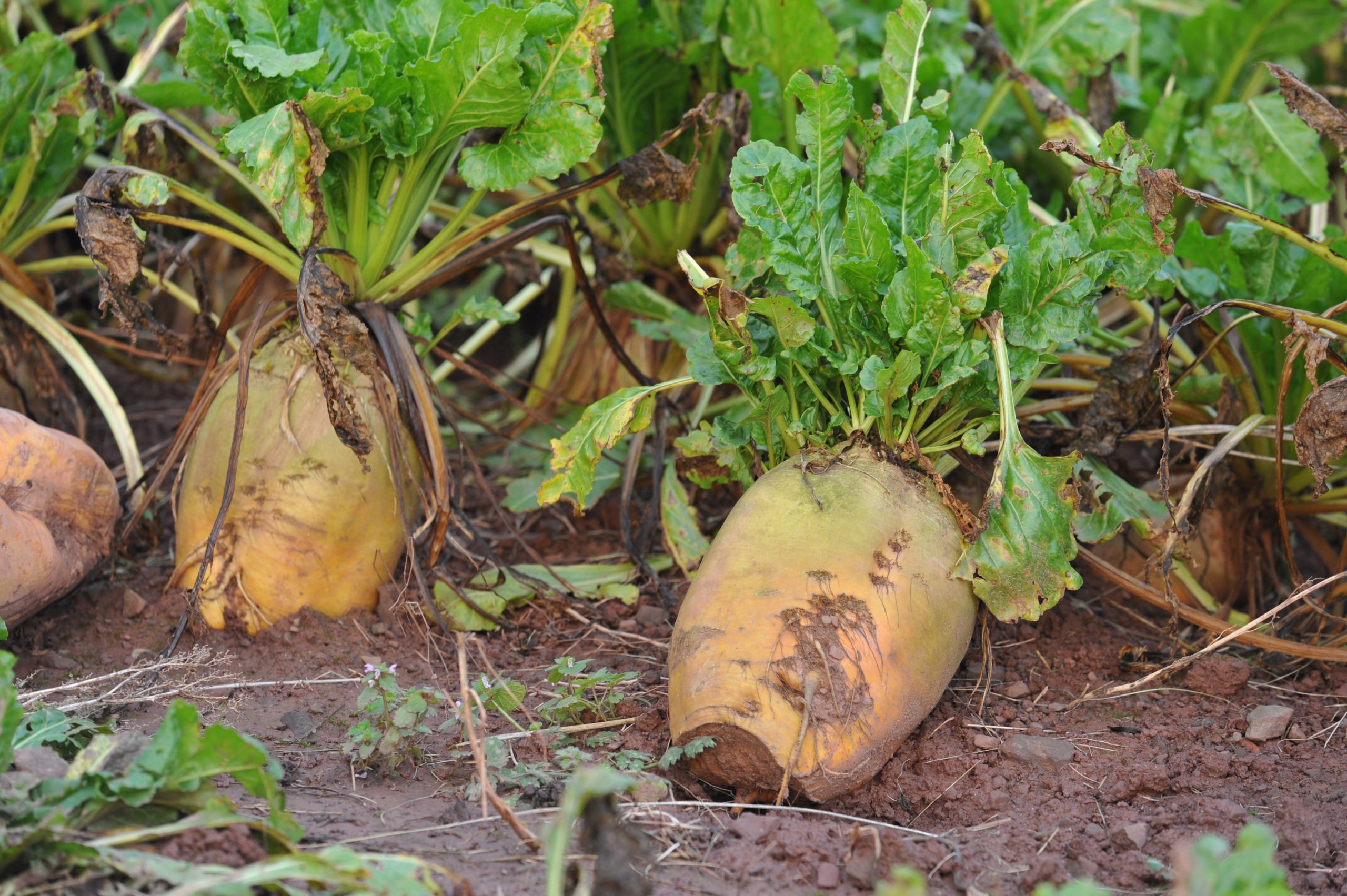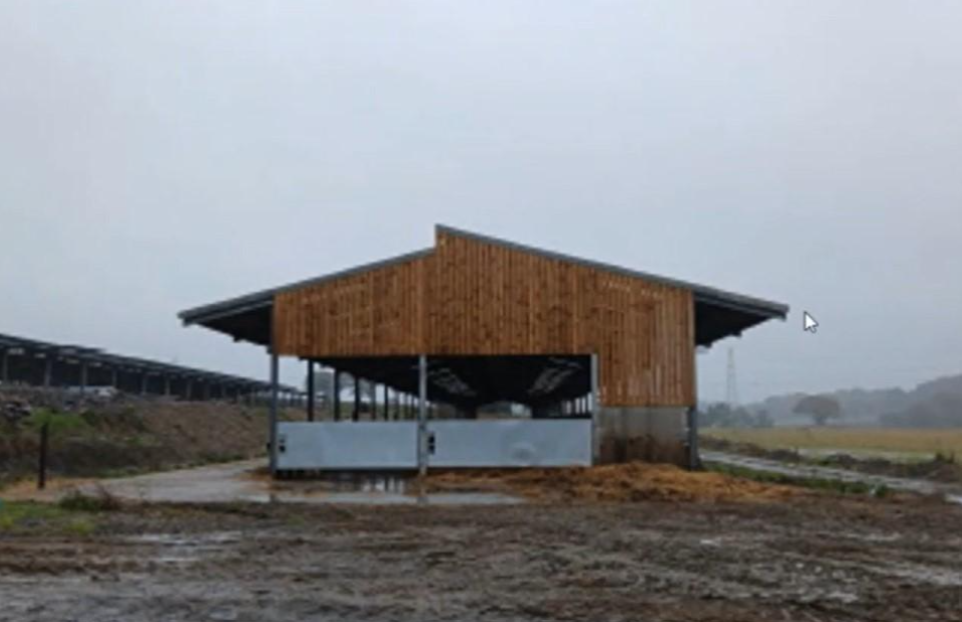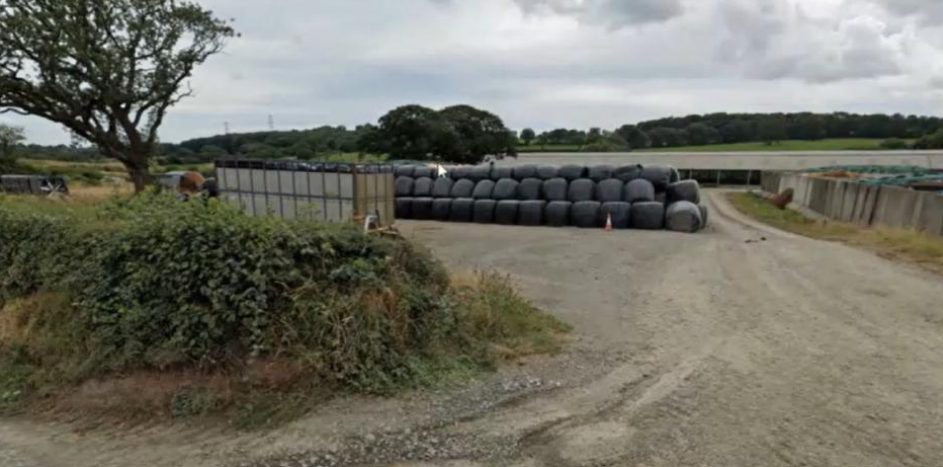Farming
Dairy farm switches to grazing fodder beet as high-quality winter feed

GRAZING fodder beet as a winter crop for beef and dairy cattle is reducing wintering costs at a Pembrokeshire farm.
The James family currently grow 10 hectares (ha) for wintering dairy beef stores produced by their dairy herd at Stackpole Home Farm, but are scaling that up to 45ha to provide feed for lactating and dry cows.
Cows are currently wintered on deferred grazing or kale with baled silage but switching to fodder beet will provide a cheaper, higher quality source of feed.
During a recent Farming Connect open day, George James, who farms with his parents, Chris and Debbie, said growing kale was getting trickier because of periods of prolonged drought following drilling in late May or early June.
“The earlier drilling dates for fodder beet give it an advantage, and we can comfortably get 20 tonne dry matter (tDM)/ha from it so it is by far the highest yielding winter grazing crop,’’ he said.
At around seven pence per kilogramme of DM, it works out at around half the cost of silage therefore the new system will reduce winter feed costs, plug feed gaps in late and early lactation, and capitalise on the farm’s free-draining sandy soils.
But transitioning the herd onto the crop and correctly allocating it will be crucial to animal health and performance.
During the open day, fodder beet expert Dr Jim Gibbs, a veterinarian and research scientist in ruminant nutrition at Lincoln University, New Zealand, and Marc Jones, an independent grass and forage consultant, shared important advice on how to get that right – and how to avoid some of the common pitfalls.
Fodder beet has a high sugar and water content so sufficient time must be given for feed intakes to adjust.
Dr Gibbs warned that dairy cows are the livestock class most susceptible to transition acidosis due to gorging, a situation which occurs if too much fodder beet is allocated too early in the transition process.
To prevent this, he advised feeding low amounts of fodder beet initially, building up intakes slowly, and providing supplementary feed to keep the cow’s rumen fully fed.
Feeding grass or silage as the supplement initially is advisable as if less palatable feed like straw is offered, cattle won’t eat the quantities they need to maintain condition and performance.
A marker for whether cattle have properly transitioned is if they are leaving beet behind – Dr Gibbs suggested this should be around 5-10% a day.
“There is no risk of acidosis after full transition providing intakes are adequate,’’ he pointed out.
A lactating cow needs 15-18kg DM in total therefore 5-6kg DM of fodder beet plus grass or silage should be the target for lactation feeding as the crop should not make up more than a third of their feed.
“Start by offering them 1kg DM/day and, once all the animals are eating the bulb, move up 1kg DM/day every two days,’’ said Dr Gibbs.
He recommended transitioning until target intakes are met.
For dry stock weighing 500kg and for in-calf heifers, the daily feed requirement is 14kg DM – as fodder beet can make up 80% of their diet, they can be allocated 11-12kg DM of fodder beet and 2kg DM roughage once they have transitioned.
Build them up to this in stages, 1-2kg DM at day one, increasing 1kg DM every other day, with 7-8kg of supplement until day seven, gradually dropping supplement to 2kg at 14 days when they have fully transitioned.
If feeding 2kg of supplement, careful consideration needs to be given as to how the supplement will be fed to enable all animals to access it; if feeding bales in ring feeders, increasing to 3-4kg is needed due to the restricted feed space.
For youngstock aged from six months, Dr Gibbs recommended starting with a daily intake of 0.5 kg DM a head of fodder beet, increasing this by 0.5kg every other day, fed with 3-5kg of grass or silage. At day 14 that mix should be 5-6kg of fodder beet and 1-2kg of grass or silage.
Marc Jones, who shared details of how he operates his system of growing and feeding fodder beet on his farm at Trefnant Hall, Berriew, said matching fodder beet varieties to class of stock is important.
He said Lactimo and Geronimo are excellent grazing varieties because they have a high proportion of leaf and more of the bulb sits out of the ground, which allows for a high level of utilisation.
A lower DM variety such as Brigadier is more palatable and will achieve better utilisation in smaller calves weighing around 200kg, he added.
Delana Davies, Cross Sector Manager at Farming Connect, who facilitated the event, said growing fodder beet provides real opportunities for reducing winter feeding costs in all classes of stock.
“Added to this there are savings to be made on housing and straw requirements plus reduced slurry and manure production and spreading issues, making growing the crop a worthwhile consideration for many dairy, beef and sheep farmers,’’ she said.
Farming
Performance recording transforms hill flock at Llysfasi college farm

A WELSH college farm is successfully lambing triplet-bearing ewes outdoors on exposed hill ground after introducing genetic performance recording to strengthen maternal traits and flock resilience.
At Coleg Cambria Llysfasi, near Ruthin, a flock of 120 pure Welsh Mountain ewes grazes land rising between 1,000 and 1,300 feet above sea level, where winter conditions can be harsh and only the hardiest sheep thrive.
Since joining the Farming Connect Welsh Sheep Genetics Programme in 2023, the farm has used Estimated Breeding Values (EBVs) to target improvements in maternal ability, growth rates and overall performance. Although genetic gains are often gradual, staff say results are already clear just three years into the scheme.
Historically, ewes carrying triplets were lambed indoors, adding labour and cost. Now, improved maternal strength means they can lamb outside with minimal intervention.

“The ewes are holding their body condition better, we haven’t had any problems lambing them outdoors and they keep their lambs very well,” said shepherd Alun Jones. “We’re seeing fewer losses and far less hands-on work. In the 2025 season we only assisted two ewes out of 120.”
The wider system runs 600 ewes, including Welsh Mountains crossed with Abertex to produce mule ewe lambs, and mules crossed with Beltex or Texel rams for finishing lamb production. Plans to phase out the Welsh Mountain breed were reversed after recognising its value for hardiness and mothering ability in upland conditions.
Performance recording began in autumn 2023 with tissue samples, body condition scoring and regular weighing to create a reliable data baseline.
“Before, we were judging by eye,” said Mr Jones. “Now we’ve got hard evidence to guide decisions.”
By identifying and removing the bottom 20 per cent of performers, the flock’s overall index has risen from £13 to £16.24 — a significant lift in commercial potential.
Lambs are currently creep-fed and sold from November to January at 38–42kg liveweight, with a longer-term aim to finish earlier and reduce concentrate use.
Farm manager Dewi Jones said the data has also changed how they buy rams.
“When you’re at a sale and you’ve got the indexes in front of you, you can draw a red line through the animals that don’t stack up. Type still matters, but figures matter just as much. Data gives you confidence in your choices.”
Some home-bred ram lambs are now matching the performance of sale-topping sires, creating opportunities to retain or market their own breeding stock.
Mr Jones believes the sheep sector could benefit from taking a more data-driven approach, similar to dairying.
“If we don’t measure, we can’t improve. Recording takes time, but the rewards are there. It’s about working smarter and building a more resilient flock for the future.”
Shepherd Alun Jones with Welsh Mountain ewes at Llysfasi.
Performance recording and weighing form a key part of the improvement programme.
Business
Langdon Mill Farm Pembrokeshire expansion signed off

THE FINAL sign-off for plans for a heifer accommodation building and associated works at one of Pembrokeshire’s largest dairy farms, with a milking herd of 2,000 cows, have been given the go-ahead.
In an application backed by councillors at the December meeting of Pembrokeshire County Council’s planning committee, Hugh James of Langdon Mill Farms Ltd sought permission for a 160-metre-long heifer accommodation building, a slurry separation/dewatering building and associated yard areas at 1,215-hectare Langdon Mill Farm, near Jeffreyston, Kilgetty.
A supporting statement through agent Reading Agricultural Consultants said: “The holding currently has a milking herd of approximately 2,000 cows, which are housed indoors for the majority of the year, with dry cows and heifers grazed outdoors when weather and soil conditions permit.

“There has been significant investment in buildings and infrastructure at the farm over the last decade in respect of cattle accommodation, slurry storage, milking facilities, Anaerobic Digestion (AD) plant, feed storage. Recently a calf and weaned calf accommodation buildings were approved by Pembrokeshire County Council with construction almost complete.
“The unit is efficient, achieving yields of more than 10,000 litres/cow/year, with cows being milked three times/day in the 60-point rotary parlour. Langdon Mill Farm currently directly employs 21 full-time, and three part-time staff. Of these, four live on site in the two dwellings opposite the farm, with the remaining staff living in the locality.”
It added: “Although the unit has previously purchased heifers to aid expansion, the farm now breeds most of its own replacements to improve genetics and to minimise the ongoing threat of bovine tuberculosis (bTB).”
It said the proposed building would be used by heifers between the ages of 7-22 months, the siting “directly influenced by the adjacent calf and weaned calf buildings, with livestock being moved from one building to the next as they get older”.
Members unanimously supported the recommendation of approval, giving delegated powers to the interim head of planning to approve the application following the final approval of a habitats regulations assessment.
An officer report published yesterday, February 5, said Natural Resources Wales confirmed it had received the assessment, and, “in consideration of the mitigation measures detailed and on the understanding there is no increase in stock, they agree with the LPA’s conclusion that an adverse effect upon the integrity of the SAC [Special Areas of Conservation] sites can be ruled out”.
Formal delegated approval has now been granted by officers.
Farming
Forgotten meats tipped as future ‘superfood’ comeback

SO-CALLED “forgotten meats” such as liver, heart and kidneys could soon find their way back onto dinner plates, with scientists suggesting they may offer a cheap, sustainable and highly nutritious alternative to modern ultra-processed foods.
Offal was once a staple of everyday diets across the UK, particularly in working-class households, but has steadily fallen out of favour in recent decades despite being rich in iron, protein and essential vitamins.
Now researchers at Aberystwyth University are working with Hybu Cig Cymru (HCC) to understand why demand has dropped and whether these cuts could be repositioned as affordable “superfoods”.
Scientists say that when nutrient-dense parts of the animal go uneaten, valuable food is effectively wasted.
Dr Siân Mackintosh, from the university’s Institute of Biological, Environmental and Rural Sciences (IBERS), said these meats could play an important role in healthier and more sustainable diets.
“Where they are not being used, these nutrient-dense ‘forgotten meats’ represent a significant loss of nutrients from our food chain,” she said. “Incorporating them as part of a balanced diet could support human health while also reducing food waste and improving environmental outcomes.”
Taste tests win over public
To test public attitudes, HCC staff have been running tasting sessions at major agricultural events including the Royal Welsh Show and the Winter Fair in Llanelwedd.
Visitors sampled dishes made with Welsh lamb’s liver, including stroganoff, traditional faggots and pâté. Organisers say many people were surprised by the flavour and keen to learn how to cook them at home.
Dr Eleri Thomas, Future Policy and Project Development Executive at HCC, said interest was stronger than expected.
“We believe there is significant potential for these forgotten meats to be incorporated back into our diets,” she said. “Consumers liked the flavour and wanted recipes and cooking tips, as well as understanding the nutritional value.”
She added that making better use of undervalued cuts could improve sustainability across the meat supply chain while creating new marketing opportunities for Welsh producers.
Part of wider sustainability project
The work forms part of the SMART Nutrient Cymru project, funded through the Welsh Government’s innovation support scheme.
Project lead Dr Christina Marley said the aim is to capture nutrients currently being lost across the agri-food system.
Alongside the collaboration with HCC, the team has also partnered with Dŵr Cymru Welsh Water on land management to protect rivers, and with British Wool to explore new uses for fleece by-products.
IBERS itself is one of eight UK research institutes strategically supported by Biotechnology and Biological Sciences Research Council, providing national expertise in grassland and plant breeding science.
Researchers say that with food prices rising and pressure growing to reduce waste, traditional nose-to-tail eating could offer both economic and environmental benefits.
Image: Welsh lamb faggots (Pic: HCC)
-

 Health6 days ago
Health6 days agoHealth board targets rise in steroid and gym drug use across west Wales
-

 Crime7 days ago
Crime7 days agoSex offender jailed after living off grid in Pembrokeshire and refusing to register
-

 Crime6 days ago
Crime6 days agoTeacher injured and teenager arrested for attempted murder at Milford Haven School
-

 Business2 days ago
Business2 days agoComputer Solutions Wales under fire from customers
-

 Business5 days ago
Business5 days agoSix-figure negligence victory leaves retired builder trapped in divorce limbo
-

 News6 days ago
News6 days agoReform appoints Dan Thomas to lead party in Wales
-

 Sport6 days ago
Sport6 days agoWales name squad for Six Nations opener against England
-

 Business4 days ago
Business4 days agoMinimum alcohol price to rise by 30 per cent as retailers warn of border impact





























